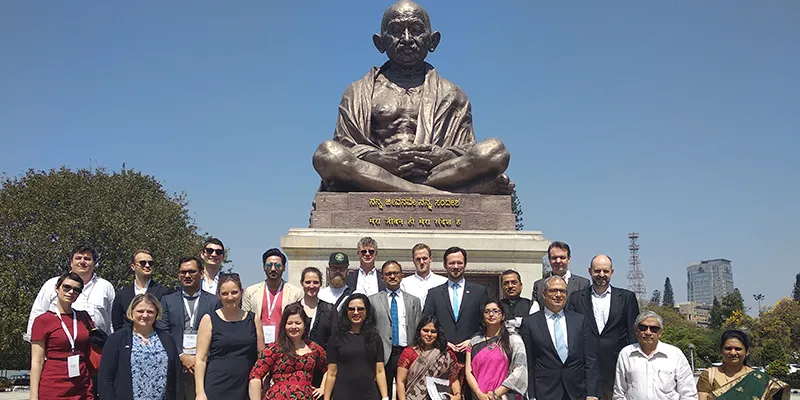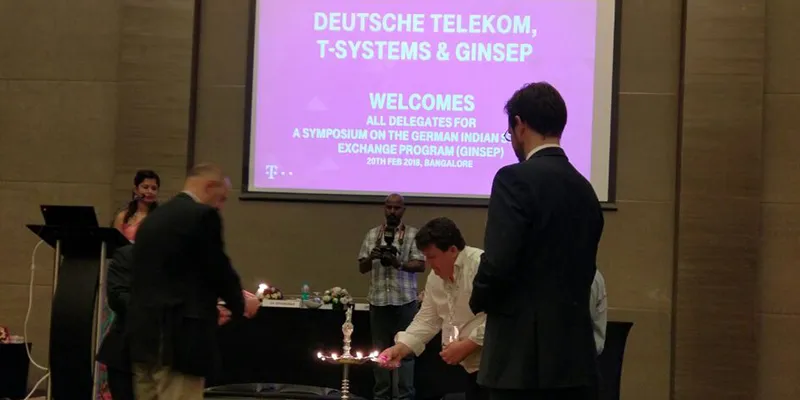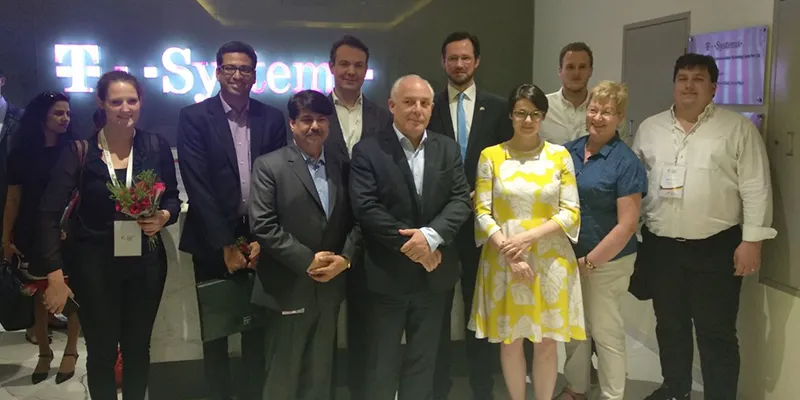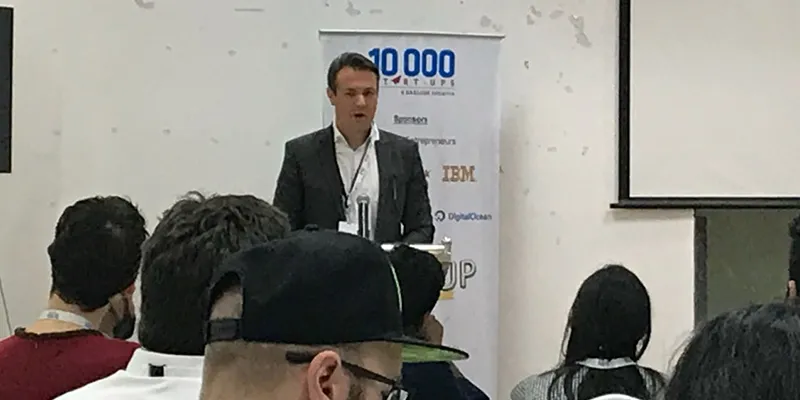German India Week roadshow races at full throttle, collaboration key to success
As the Greman India week roadshow organised by the German Startups Association proceeded through the Bengaluru startup landscape, Day 2 proved to be a time well spent.
A 24-member delegation of German investors, entrepreneurs, and Federal officials is on a five-day tour of India that includes meeting startup stakeholders in Bengaluru and Delhi.

By now settled into the rhythms of a city that embraces chaos and control with equal ease, the German delegation got an opportunity to visit the two top unicorns housed in Bengaluru – Ola and Flipkart. The sheer scale of operations of the ride-sharing app and ecommerce biggie was a source of wonder for the visitors.
But before that, the morning was dedicated to meeting government officials – the key to any kind of business association between countries.
The delegation was joined by Dirk Wiese, Parliamentary State Secretary at the Federal Ministry for Economic Affairs and Energy, to meet with Principal Secretary Gaurav Gupta, Department of Information Technology, Biotechnology and Science-tech, Government of Karnataka, and other officials.
In today’s highly-connected world thanks mostly to the internet, face-time and on-ground meetings assume a bigger significance. So when top government officials from the two countries shake hands over a morning coffee meeting, it essentially signals a green flag to businesses and entrepreneurs.
For the visiting delegation, interactions like this and those mentioned in their packed agenda allow them to see the big picture.
What emerged from the various conversations through the day was the lesson that by putting their core competencies to use, German and Indian businesses can ensure a successful collaboration.
Germany is known for its precision in manufacturing and hardware, while India is known for its IT software power. This combination of brawn and brain as it were, could be put to solving some pressing issues in India while at the same time ensuring that German startups get to explore new market opportunities.

As Laszlo Posset, Managing Director, T-Systems ICT India, said “Recent years have shown that startups can bring innovation better than corporations. There are a lot of complementary core-competencies between the two countries. What we are missing in Germany is the quality of young talent of IT developers.”
T-Systems, a subsidiary of Deutsche Telekom, hosted a symposium and dinner for the delegation. Referring to the Indian tradition of lighting the lamp at the start of the symposium, Dirk Wiese alluded that it was symbolic of bringing the German-Indian collaboration into the limelight.
German startups, Indian solutions
It is imperative that the visitors’ questions of what would attract German companies to come to India and what policy would make it a worthy cause are answered on this trip.
Mirco Dragowski, MD of the German Startups Association, and member of the German Indian Startup Exchange Program (GINSEP), a project of the German Startup Association, illustrated this with a few examples of German startups, which are using their technical know-how to solve some unique Indian problems.
Peat.technology makes farming intelligent with its data capture feature that helps farmers mitigate crop damage. It trains self-learning algorithms (Deep Neural Networks) to distinguish between different patterns that are left by plant diseases, pest or nutrient deficiencies and is working with Indian farmers to implement its solutions.

Coolar.co is developing a technology (which does not rely on electricity) that allows health centres and hospitals in remote rural areas to store medical equipment that requires refrigeration.
The mobility company Door2Door.io, is an advanced public transport with on-demand ridesharing solutions. This could have applications in India to solve the traffic problems. Similarly, the technology of the smart online particle analysis technology startup, Sopat.en, too, could have potential use in the Indian market.
The meeting at Nasscom 10,000 Startups Warehouse was significant as it brought all the concerned parties under the same roof. Along with Parliamentary State Secretary at the Federal Ministry for Economic Affairs and Energy Dirk Wiese, Indo-German Chamber of Commerce, the German Consulate, German and Indian corporates like Shell, SAP, Bosch, Airbus, Siemens, L&T, Infosys, Wipro, and Axilor Venture Capital, among others addressed the delegation.
Siemens announced it plans to launch a startup incubator by 2019 in Bengaluru while Airbus BizLabs stated that it has its only India centre in Bengaluru. The rest four are located in Europe.
The majority of corporates are looking at startups in the data analytics space, space technology, healthcare, fintech, and IoT.
They all have on-going collaborations with Indian startups either as customers of their products or to co-create with them to go to market.

“There has been a perception over the last three years that Indian startups are focused only on the consumer space, but it is exciting to see hardware startups and those in deep tech now,” said Ganapathy Venugopal of Axilor Ventures, an accelerator founded by some of the most respected entrepreneurs, including Kris Gopalakrishnan, Executive Vice Chairman of global consulting and IT services company Infosys.
Wipro said they would like to engage with startups in Germany, especially those in after-market solutions and IoT. Hari Menon, Vice President at Wipro, said the Azim Premji-led Indian corporate already has a $100 million fund for startups from India, the Bay Area, and Israel.
Run to potential
The most-apt summary of the day perhaps came from one of the guest of honours at the T-Systems evening, Kiran Kumar, former Chairman of ISRO and the recipient of Padmashree, one of India’s top civilian honours. Credited with the development of key scientific instruments aboard the ‘Chandrayaan-1’, ISRO’s mission to the Moon, and the ‘Mangalyaan’, ISRO’s path-breaking Mars mission, Kiran Kumar retold the popular fable of the ‘Hare and the Tortoise’ but with a twist.
“All of you know what happened in that famous race,” he began. “But over the years, there have been additions to the story and it would do us well to learn from that also,” he added.
So, after the tortoise wins the race, the hare introspects and realises that it lost the race not because it did not have the ability but because it failed to realise its potential. It asks for a rerun. They race again and this time, the hare wins. Moral of the story: If you perform to your potential you are sure to reach the target.

Not to be outdone, the tortoise asks for a rerun. This time, it chooses the race course of its choice – the river. Naturally, it wins. Moral of the story: If you have the skills and knowhow you can perform to your potential.
Having run three races together, the two become friends. But both want to win and are not ready to give up easily. The two make a dash for the target, but this time, with each other’s help on water and land. And they win. Moral of the story: If individuals work together rather than against each other they can outperform any task.
This story, as most stories are, is as much true for individuals and companies, as it is for nations.
(Watch this space for more details on the German India roadshow)







